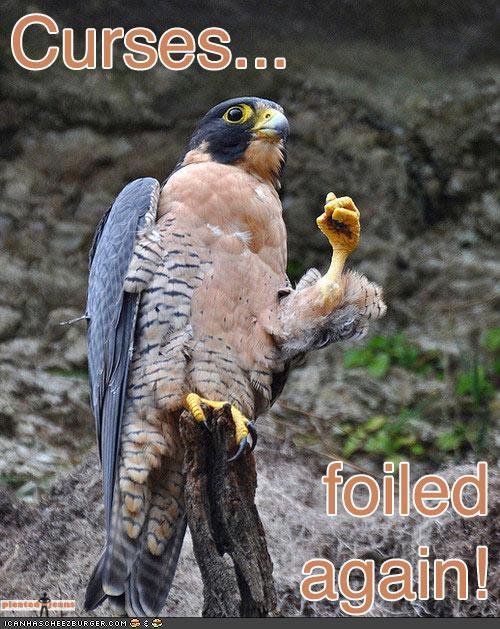
adjective Architecture.
- ornamented with foils, as a gable, spandrel, or balustrade.
verb (used with object)
- to prevent the success of; frustrate; balk: Loyal troops foiled his attempt to overthrow the government.
- to keep (a person) from succeeding in an enterprise, plan, etc.
noun
- Archaic. a defeat; check; repulse.
noun
- metal in the form of very thin sheets: aluminum foil.
- the metallic backing applied to glass to form a mirror.
- a thin layer of metal placed under a gem in a closed setting to improve its color or brilliancy.
- a person or thing that makes another seem better by contrast: The straight man was an able foil to the comic.
- Architecture. an arc or a rounded space between cusps, as in the tracery of a window or other ornamentation.
- an airfoil or hydrofoil.
verb (used with object)
- to cover or back with foil.
- to set off by contrast.
verb (tr)
- to baffle or frustrate (a person, attempt, etc)
- hunting (of hounds, hunters, etc) to obliterate the scent left by a hunted animal or (of a hunted animal) to run back over its own trail
- archaic to repulse or defeat (an attack or assailant)
noun
- hunting any scent that obscures the trail left by a hunted animal
- archaic a setback or defeat
noun
- metal in the form of very thin sheetsgold foil; tin foil
- the thin metallic sheet forming the backing of a mirror
- a thin leaf of shiny metal set under a gemstone to add brightness or colour
- a person or thing that gives contrast to another
- architect a small arc between cusps, esp as used in Gothic window tracery
- short for aerofoil, hydrofoil
verb (tr)
- to back or cover with foil
- Also: foliate architect to ornament (windows) with foils
noun
- a light slender flexible sword tipped by a button and usually having a bell-shaped guard
c.1300, foilen “to spoil a trace or scent by running over it,” irregularly from Old French fouler “trample,” from Vulgar Latin *fullare “to clean cloth” (by treading on it), from Latin fullo “one who cleans cloth, fuller,” of unknown origin.
Hence, “to overthrow, defeat” (1540s). Sense of “frustrate the efforts of” first recorded 1560s. Related: Foiled; foiling. Foiled again! as a cry of defeat and dismay is from at least 1847.
“thin sheet of metal,” early 14c., from Old French fueille “leaf,” from Latin folia “leaves,” plural (mistaken for fem. singular) of folium “leaf” (see folio).
The sense of “one who enhances another by contrast” (1580s) is from the practice of backing a gem with metal foil to make it shine more brilliantly. The meaning “light sword used in fencing” (1590s) could be from this sense, or from foil (v.). The modern sense of “metallic food wrap” is from 1946.
 Liberal Dictionary English Dictionary
Liberal Dictionary English Dictionary